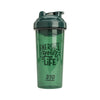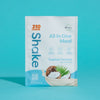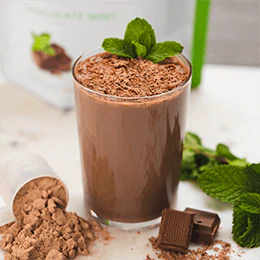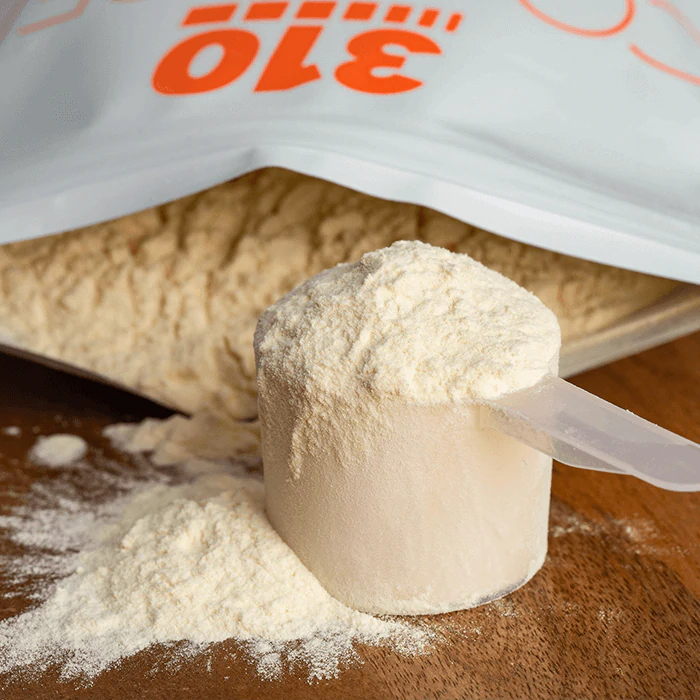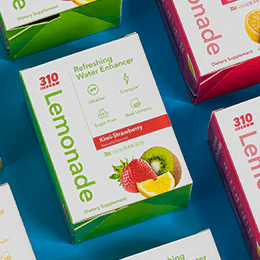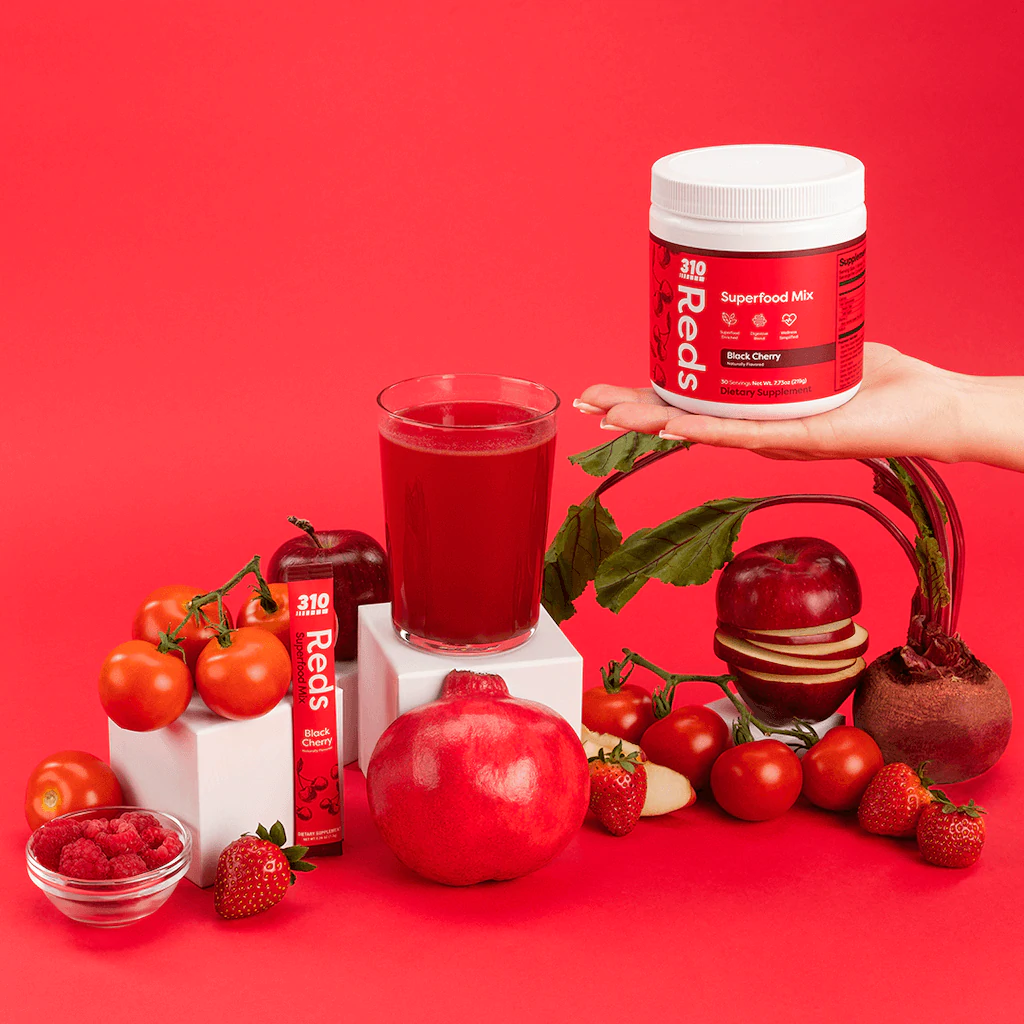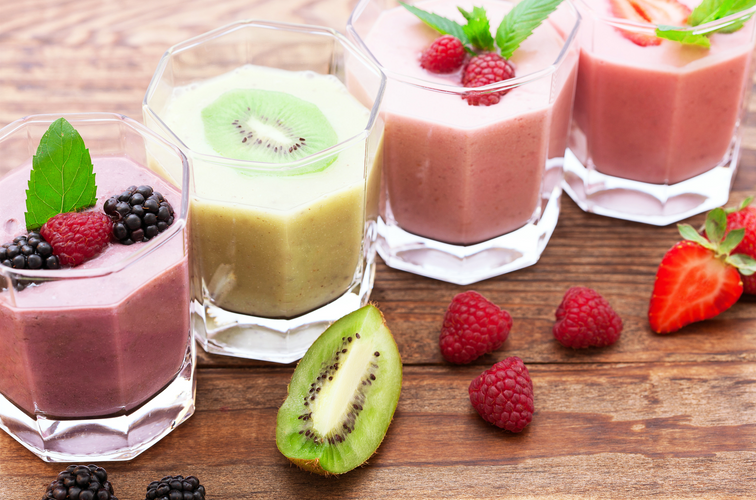What exactly is the difference between a meal replacement shake and a protein shake? And which one’s right for you?
The short answer: Both should be high in protein but their other ingredients vary pretty considerably. They’re also intended for very different purposes which means that the right one for you depends on your goals and what you’re looking for.
Let’s dive in to learn more!
Protein Shakes
Protein shakes, as the name implies, focus on adding protein to your diet. They’re food supplements, not replacement meals. This means they’re not meant to replace the nutrition of a full meal, but rather supplement additional protein into your diet.
They’re often used by athletes or those performing vigorous or high-intensity workouts to add more protein into the diet to sustain them after their workout or to help build muscle. By adding more protein to your diet in addition to the meals you’re eating, a protein shake can help support your muscle growth and recovery for maximum workout benefit.
The goals of a protein shake include:
- Muscle growth
- Exercise recovery
- Improved exercise performance
- Increased protein intake
- Weight gain or greater muscle mass
Meal Replacement Shakes
Meal replacement shakes are exactly as they sound, shakes meant to replace or substitute the nutrition of a full meal but with far fewer calories. Some are pre-packaged drinks ready for consumption and others are powders (like 310 Shakes) that you can add to a smoothie, water, or other beverage.
High-quality meal replacement shakes contain a good amount of protein, fiber, and essential vitamins and minerals to ensure you’re getting a healthy, and low-calorie, amount of nutrients in your day. You can use meal replacement shakes daily as a strategy for weight loss by replacing 1-2 meals a day.
The goals of a meal replacement shake include:
- Replacing the full nutrition of a meal
- Support healthy weight loss or weight maintenance
- Add more protein, fiber, vitamins, and minerals into your diet
Can You Use a Protein Shake as a Meal Replacement Shake?
No, protein shakes are not designed to completely replace a full meal, unlike meal replacement shakes. While both should have a high protein count, most protein shakes don’t include the necessary vitamins, minerals, and nutrients that you need to replace a full meal in a healthy way.
Here are the key reasons why:
Calories
Meal replacement shakes can replace a full meal, meaning they’re going to naturally have a higher calorie count than most protein shakes. Meal replacements tend to be high in dietary fiber, protein, and carbohydrates to match the nutritional profile of the meal you’re replacing and to help you feel full for longer.
However, compared to a full meal, meal replacements are still low-calorie alternatives. This is what makes them helpful as a part of your healthy weight loss strategy.
Sugar
Protein shakes tend to be high in two ingredients: protein and added sugar. While they can help you bulk up as part of a workout, if you consume too much of a high-sugar protein shake without enough exercise, you could end up bulking up with unwanted weight gain just through all that added sugar.
Many meal replacement shakes are also high in added sugar, although a high-quality blend should not have a high sugar content. 310 Shakes, for example, contain 0 grams of sugar per serving. Instead of using real sugar or artificial sugar, we sweeten our 310 Shakes using plant-based sugar alternatives Stevia and monk fruit.
When trying to lose weight, it’s best to avoid sugar as much as possible. Sugar is high in calories, doesn’t provide essential nutrients, and doesn’t help curb your appetite. This makes high-sugar protein shakes counterproductive to most healthy weight loss goals.
Vitamins and Minerals
When looking to lose weight and cut back on calories, it can be hard to get all the nutrients you need for a healthy diet. That’s why high-quality meal replacement shakes are fortified with the right vitamins and minerals you need to sustain your body and replace the nutrition of a full meal.
Some vitamins and minerals you might find in your meal replacement shake are calcium, potassium, iron, vitamin D, magnesium, and zinc. Protein shakes, on the other hand, are very rarely high in vitamins and minerals.
Protein
Protein shakes tend to have a higher protein content than meal replacement shakes given they’re used for protein supplementation. However, it’s possible to find a high-protein meal replacement shake. When looking for a meal replacement shake as part of your weight loss journey, aim for a shake that contains anywhere between 15 and 25 grams of protein.
It’s also essential to consider the type of protein in your meal replacement shake because not all proteins are the same. 310 Shakes contain 15 grams of protein which is within that recommended amount.
Can You Use a Meal Replacement Shake as a Protein Shake?
The best meal replacement shakes are the ones that fulfill the goals of both a protein shake and a meal replacement shake. High protein meal replacement shakes help to satisfy hunger and keep your calorie count low throughout the day by reducing the temptation to eat more than is necessary. A high-protein meal replacement shake can also compliment your workout for added muscle growth while satisfying your hunger.
The problem is a lot of meal replacement shakes don’t have high enough protein levels to satisfy your hunger. In fact, many meal replacement shakes contain as little as two to nine grams of protein per serving in their shakes. This isn’t enough to keep you feeling full throughout the day or for supporting muscle recovery.
This is why 310 Shakes contain 15 grams of protein, which is within the recommended amount for a meal replacement shake. We know at 310 that one of the biggest barriers to successful weight loss is sticking to a low-calorie diet when you’re feeling hungry and unsatisfied. With 310 Shakes, you can reap the benefits of a protein shake while also helping to replace your meals as part of your weight loss journey.
So, Which One’s Right for You?
It all depends on your goals!
- If you’re looking to replace your meals with a shake for help with weight loss, a meal replacement shake is right for you.
- If you’re looking to supplement your protein or gain muscle mass as part of high-intensity exercise, a protein shake is right for you.
While both can support your athletic goals and performance, only meal replacement shakes can replace the full nutrition of your meal.
Best for Protein: 310 Meal Replacement Shakes
With a healthy blend of 15 grams of plant-based protein, 310 Shakes assist in your weight loss journey. Our shakes help to reduce your cravings throughout the day while supplying your body with all the essential amino acids it needs.
Not only that, but at 310 we focus on building a community around healthy weight loss supporting you with everything from clean eating to delicious shake recipes. For us, it’s not just about weight loss, it’s about feeling more confident, healthy, and happy in your body.
Looking for more protein and healthy weight loss tips? Check out our blog posts Health & Weight Loss Benefits of Pumpkin Protein and The Best Protein Shake Recipes for Weight Loss. Plus get started on the right foot for your weight loss journey with even more resources at our 310 Nutrition Blog.

